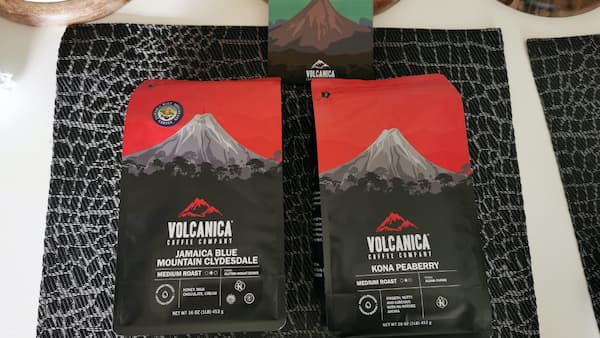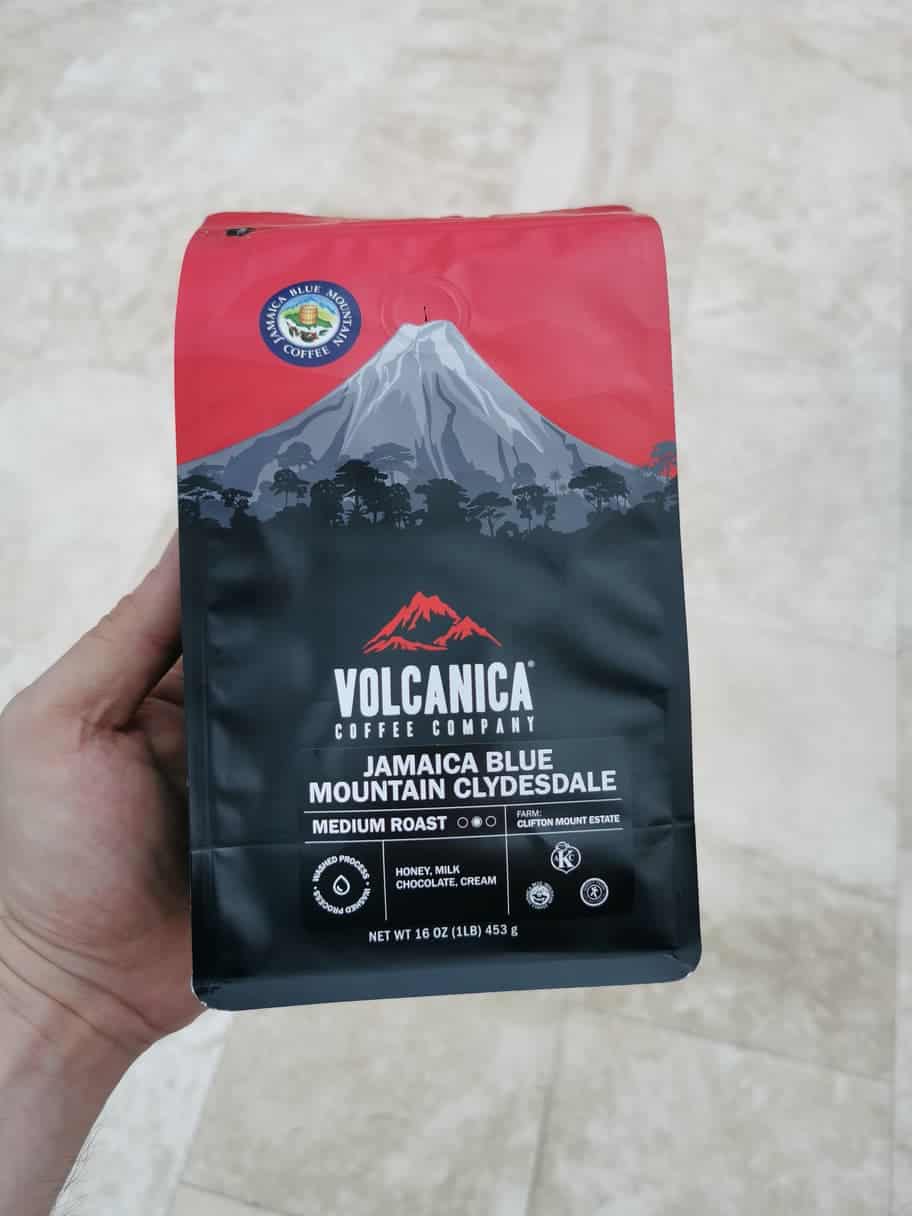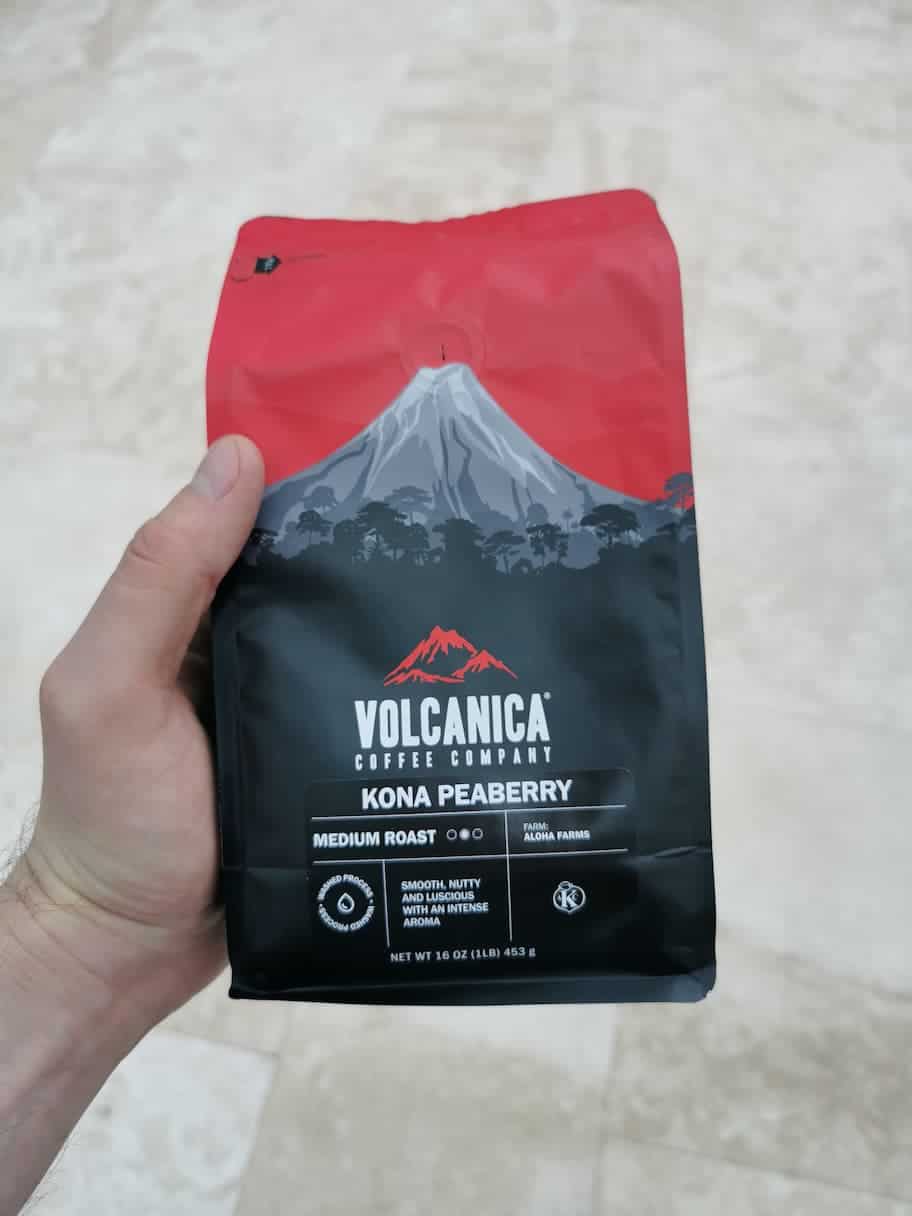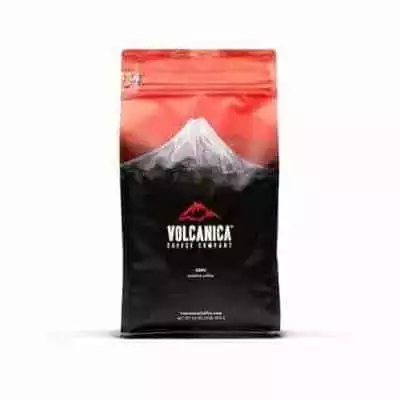Volcanica Coffee Review
You’ve heard about the trends in coffee and brewing. From the mundane to the bizarre, we’ve covered single-origin and nitro coffee to extreme caffeine and even animal poo coffee.
But have you heard about coffee grown in volcanic soil?
Coffee grown in volcanic soil isn’t a passing fad. Coffee lovers in the know have heard that growing coffee in soil on the slopes of volcanoes creates a difference that you can taste in the cup. And there’s a company that specializes in these amazing coffees, Volcanica Coffee.
Perhaps you’ve heard about Volcanica and its high-quality coffee beans that are grown on the slopes of volcanoes around the world.
But, Is this coffee for you? Is coffee grown in this soil better? We’ll get into that and more in this taste tested Volcanica Coffee review.
Who Is The Volcanica Coffee Company?
Volcanica Coffee Company is a family-run business based in Atlanta, Georgia. But the roots go back even further, to Central America.
When the family visited their hometown in Costa Rica, they remembered how flavorful coffees could be. They weren’t finding those flavors in the typical coffee in the United States.
- Speciality beans sourced from around the globe and roasted on demand.
- The coarsest grind available is perfect for French Press brewing.
PROS (+)
- Ships right after roasting to conserve flavor
- Features coffee from the best growing regions
- Great customer service
CONS (-)
- No light roasts
- Only Arabica beans
Volcanica Coffee Is great for: Coffee lovers who want fresh, high-quality coffee. Volcanica Coffee company roasts the coffee and sends it out within a day. It’s also for coffee drinkers who want to know where their coffee is from and who grows it.
Volcanica Coffee Isn’t so good for: Coffee drinkers who want a more economical choice. These high-quality coffees have been carefully selected, which raises the prices. However, if you’re one for a coffee subscription, Volcanica will knock off 10% per order if your opt in to one (there’s no minimum term).
Volcanica sources over 150 different coffees from around the world. They even have unusual coffee beans like low acid coffees, estate coffees, and the little-known peaberry coffee.
As the name suggests, Volcanica specializes in coffees that are grown on the slopes of volcanoes. But, does that really produce the best coffee?
The increased mineral content from volcanic ash creates soil that’s very fertile. That fertile soil nourishes the coffee plants, which produce extraordinary coffee cherries.

Inside the cherries, the coffee seed takes on rich, complex flavors from the fruit that encases it. Once those coffee seeds are processed, they become irresistible coffee beans with tastes that range from fruity to dark chocolate.
Volcanica knows that coffee beans taste best shortly after roasting, so they roast in small batches and ship right away. And they treat their customers like family, which means prompt and courteous customer service.
Volcanica roasts mostly single-origin coffees. Why is that something to boast about? Because of the terroir. You might have heard that term applied to wine, and you know that wine from different countries tastes different.
French wine will never be the same as wine from California for many reasons. Some of the most important reasons are the climate, regional traditions, and the soil.
A good winery wouldn’t want to mix a fine wine from France with a fine wine from California because they would lose the special taste profiles of each terroir.
Coffee is quite similar. The differences between a coffee from Costa Rica and a coffee from Ethiopia can be enormous. Keeping origins separate while roasting means you can delve into the special tastes and profiles of each country.
Single-origin coffees require greater quality control in purchasing and care in roasting. But they can be unique and memorable coffees that are worth the extra care.
Related Read: Best Online Coffee Roasters
Volcanica Coffee Review
Beans & Roasts
Volcanica offers a wide selection of coffee beans from all around the world.
To make it easier for you to find the best coffee for you, they list their coffee beans in general categories.
You can shop by region, certification, roast, blend, peaberry, or estate. You can also choose from organic, low acid, flavored, or decaf categories.
What is involved with those categories? In this Volcanica Coffee review, we’ll do a breakdown of each one and what it means for you.
Single-origin coffees
Each region around the world produces coffee beans with different characteristics.
Some regions are known for their chocolatey, intense coffees. Others are known for coffee beans that taste of caramel or spices.
Whereas others produce fruity coffees with high acidity. When the roaster separates those coffees rather than blending them, you can enjoy the exotic flavors of each region.

Estate coffee
Estate coffee takes single-origin coffee a step further. You can not only trace what country or what area the coffee is from, but you can choose which farm or group of farms produced the coffee.
This way you can track sustainability and understand the characteristics common on that farm or mini-region. Estate coffee is one of the highest levels of specialty coffee when it comes to tracing the origin.
Peaberry coffee
The little-known but much-loved peaberry bean is a rare occurrence. Instead of forming two coffee seeds within the fruit, just one small round seed is formed.
This only happens in about 5% of coffee crops. This small bean generally has more flavor and brews into a spectacular cup. It’s also more expensive because of the special handling that it requires.
Low acid coffee
If you’re a coffee lover with sensitivity to acid, you will appreciate these low acid coffee beans that have a PH of 5 or higher.
You can choose from coffees from around the world that have low acid. That includes cage-free Kopi Luwak, which is low acid due to its unusual processing method.
Organic coffee
Organically grown coffee avoids the use of chemicals, whether for pest control or fertilizers.
Coffee farmers compost to add nutrients to the soil, and they use natural methods to discourage pests that plague coffee farms.
This benefits the planet, the coffee farmers, and consumers.
Decaf
At Volcanica, decaf coffee is processed without chemicals using the Swiss Water Process. It’s 99.9% caffeine-free and still tastes good.
Related Read: Decaf Coffee
Dark roast
Volcanica doesn’t do a lot of dark roast coffees for a reason. Dark roasts are smoky and rich, but they do tend to hide the flavors inherent in high-quality coffee.
If you’re yearning for a dark, smoky cup, you can find some espresso roasts and French Roast.
Related Read: Dark Roast Coffee
Rare & Flavored coffee
If you’re longing for flavored coffees, Volcanica has an offering that reads like the dessert menu of a fine restaurant.
They have crème brulee, butterscotch toffee, caramel crunch, dark chocolate decadence, salted caramel, and southern pecan. Their coffees are flavored with natural ingredients and have no sugar or calories.
Or check out their coffees by the certification the farms have received. You can choose from Fair Trade, Rainforest, Shade Grown, Organically Grown, or Jamaica Blue Mountain coffee.
Coffee by geography
They also categorize the beans by geography. You can hop right into coffee from Africa & Arabia, the Americas, the Caribbean, or Indonesia, and the Pacific.
- African and Arabia feature coffee from Ethiopia, Kenya, Cameroon, India, Malawi, Tanzania, Yemen.
- The Caribbean includes Dominican, Guatemala, Jamaica Blue Mountain, Puerto Rico, and some coffees that overlap with the Americas region.
- Americas encompasses Costa Rica, El Salvador, Brazil, Bolivia, Nicaragua, Mexico, Hawaii (Kona Coffee), Colombia, Peru, and Panama.
- Indonesia and the Pacific includes coffee from Hawaii, Indonesia, Nepal, Papua New Guinea, Sulawesi, Sumatra.

Anything they are missing?
With over 150 coffees to choose from, you might think Volcanica has all the coffees you could want.
But if you’re searching for light roasts, you may be disappointed. They tend towards medium roasts and have a selection of dark roasts, but they have few true light roasts (check out their Honduras Natural).
Most Popular Volcanica Beans
Kenya AA
One of their most popular coffees, they roast the Kenya AA lighter so the typical tastes of coffee from Kenya come through.
What are those tastes?
When I try a coffee from Kenya, I expect to get a highly aromatic coffee with a wine-like acidity, full body, and bold fruity tastes.
The Volcanica Kenya AA met my expectations. The aroma is pleasant and fruity. The brewed coffee had complex tastes of fruit and berry. Yummy!
It’s a bright coffee that is pleasant even for people who aren’t used to fruity coffees. I taste-tested it on coffee drinkers who aren’t used to bright coffees, and they enjoyed it.
You might be asking what Kenya AA means. In the Kenya coffee grading system, a qualification of AA identifies large beans that also have large flavor.
Related Read: Kenyan Coffee
Ethiopian Yirgacheffe
Volcanica offers an Ethiopian Yirgacheffe that ticks all the right boxes. The medium roast coffee is Fair Trade, organic, and has a good body.
As for flavor notes, Ethiopian Yirgacheffe is generally a bright, fruity coffee with complex flavors. This one by Volcanica is no exception.
I enjoy the spicy fragrance and distinct sweetness this medium roast coffee has. It’s fruity at the start and finishes with chocolate notes.
I brewed this coffee in several methods and found it did well in French Press, Aeropress, and V60. Although it’s already a bright coffee, it also does well for espresso shots. And this delicious coffee is still quite affordable.
Related Read: Ethiopian Coffee
Sustainability
A Volcanica coffee review would not be complete without talking about sustainability.
The clear values and ethics of Volcanica set them apart. Most of those values and ethics are tied to sustainability. But what is coffee sustainability?
There are several ways to look at sustainability. One is economic sustainability. It’s well known that the coffee growers are the ones who are generally paid the least along the whole chain.
Volcanica works directly with farmers to pay above-average prices that are fair. Some of their coffees are Fair Trade Certified.
Another way to look at sustainability is how coffee affects the environment. You can see the potential impact of a farm reflected in the certifications that the farmers receive.
They only tell part of the story, but certifications such as organic let you know that the farm protects the environment. Most of the coffees offered by Volcanica are organic.
Rainforest Alliance Certified coffee is produced by farmers who meet social, economic, and environmental sustainability requirements. This ensures that people and the planet are properly cared for.
Why is coffee grown in the shade important?
To fit as many coffee plants on a farm as possible, farmers may cut down shade trees. When those shade trees are gone, soil erosion is inevitable, and birds and other animals lose their habitat.
Choosing shade-grown coffee is another way to help the environment. Coffee plants thrive under a canopy of shade trees that provide a home to countless birds and insects.
This, in turn, cares for the soil. And it produces some sweet and flavorful coffees!
They also donate to charity: water. This non-profit organization helps fund projects that provide clean water to communities in developing countries.
From wells to piped water systems, they help create sustainable systems for communities in need.
Why does Volcanica Coffee support this charity?
Because water quality is a big issue in coffee communities, and charity: water supports projects in many countries that Volcanica sources coffee from.
Brand Reputation
Volcanica is growing rapidly. And that growth has caught the attention of the business world.
Inc. Magazine included Volcanica in their 2021 list of the nation’s fastest-growing private companies. That’s a tremendous accomplishment at any time, but even more so in the turbulent times due to the pandemic.
Values have a lot to do with that growth. The Christian values of the founding family impel Volcanica to care for others, both those who grow coffee and those who drink it.
That kind of care has created a brand with a great reputation that puts freshly roasted coffee in the hands of people who want something different. With all those satisfied customers, it’s no wonder they’re growing fast.
In addition to the good quality, they keep shipping prices at a minimum. They have a low flat rate and free shipping on US orders of $60 or more.
Before you finalize your order, you’ll know when your coffee will ship out and the expected delivery time. They also offer international shipping.
I like Volcanica because from the website to the final brewed coffee, the experience was seamless.
The website is attractive and easy to use. I could choose coffee from the country I wanted with the certifications that matter to me.
The coffees are clearly labeled and explained, so I don’t have to wonder what tastes I will get. They also clearly state if the coffee is a dark roast, medium roast or light roast.
Shipping is fast and efficient. The coffee is fresh, and you’ll prove that when you brew it and see the coffee foam up (which is the CO2 gasses escaping from the freshly roasted beans).
The Final Verdict
If you’re a coffee lover that’s hunting for great-tasting coffee from a wide range of origins that’s roasted and shipped out to you fresh, Volcanica Coffee may be a fantastic option for you.
- Speciality beans sourced from around the globe and roasted on demand.
- The coarsest grind available is perfect for French Press brewing.
You can even find coffees that are hard to track down, like 100% Jamaican Blue Mountain, peaberry coffees, or single estate coffees.
If you’re looking for the least expensive coffee on the market, this may not be the coffee for you.
Also, if you’re looking for a large selection of very light roast or very dark roast coffee, you may be disappointed by the options.


